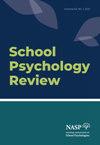学校氛围如何影响整个学年的其他社会心理知觉和学业成就
IF 3
3区 心理学
Q1 Social Sciences
引用次数: 0
摘要
摘要研究文献表明,学校氛围对学生学业成绩有重要影响;然而,跨时间评估学校氛围和成就相关结果的研究是有限的。在本研究中,对531名九年级学生进行了一学年的研究,考察了学校氛围、学生心理社会知觉和学生成绩之间的关系。层次线性回归结果显示,学校氛围对学业动机和学业希望方差的预测率为10.5%,对自我效能感方差的预测率为8%,对学业自我概念方差的预测率为5%,对目标评价方差的预测率为3%,对春季学期GPA方差的预测率为2%。此外,尽管学校氛围被运作为学校文化、对教师的态度和对学校的态度,但只有对教师的态度显著地预测了任何结果变量。这些结果表明,学校氛围的某些方面在塑造学生的社会心理感知和成就方面比其他方面贡献更大。尽管人们普遍认为学校气候对学生的学习成绩很重要,但现有的学校气候研究缺乏跨时间的调查。本研究评估了学校氛围、以学业为导向的社会心理感知和学生一学年成绩之间的关系。本研究结果显示,对教师的态度是心理社会知觉的唯一显著预测因子,而希望和学习动机受学校气氛知觉的影响最大。关键词:动机自我概念师生关系副主编:Tamika La Salle-Finley附加信息撰稿人注:sersie - anastasia Gentzis在休斯顿大学获得心理学学士学位(荣誉),并在密歇根州立大学获得学校心理学硕士学位。她目前是密歇根州立大学学校心理学博士项目的博士候选人。Dante D. Dixson在加州大学伯克利分校获得心理学学士学位(荣誉)、教育学硕士学位和学校心理学博士学位。目前,他是密歇根州立大学学校和教育心理学项目的副教授,并获得了校内和校外心理学实践的认证。本文章由计算机程序翻译,如有差异,请以英文原文为准。
How School Climate Relates to Other Psychosocial Perceptions and Academic Achievement across the School Year
AbstractThe research literature indicates that school climate is important for student outcomes; however, research assessing school climate and achievement-related outcomes across time is limited. In this study, the relationship between school climate, students’ psychosocial perceptions, and student achievement was examined across an academic school year in a cohort of 531 9th-grade students. A series of hierarchical linear regressions indicated that school climate predicted 10.5% of the variance in both hope and academic motivation, 8% of the variance in self-efficacy, 5% of the variance in academic self-concept, 3% of the variance in goal valuation, and 2% of the variance in spring semester GPA. Further, despite school climate being operationalized as school culture, attitude toward teachers, and attitude toward school, only attitude toward teachers significantly predicted any of the outcome variables. These results suggest that some aspects of school climate contribute more than others in crafting students’ psychosocial perceptions and achievement.Impact StatementDespite the widespread belief that school climate is important for student outcomes, the existing school climate research lacks investigations across time. This study assessed the relationship between school climate, academic-oriented psychosocial perceptions, and student achievement across an academic school year. This study’s results indicate that attitude toward teachers was the only significant predictor of psychosocial perceptions and that hope and academic motivation were most influenced by school climate perceptions.Keywords: Motivationself-conceptstudent teacher relationshipsASSOCIATE EDITOR: Tamika La Salle-Finley Additional informationNotes on contributorsErsie-Anastasia GentzisErsie-Anastasia Gentzis received her bachelor’s degree (Honors) in psychology from the University of Houston and her master’s degree in school psychology from Michigan State University. She is currently a doctoral candidate in the School Psychology Doctoral Program at Michigan State University.Dante D. DixsonDante D. Dixson received his bachelor’s degree (Honors) in psychology, master’s degree in education, and Ph.D. in School Psychology from the University of California, Berkeley. Currently, he serves as an Associate Professor at Michigan State University within the School and Educational Psychology Programs and is certified for the practice of psychology both inside and outside of schools.
求助全文
通过发布文献求助,成功后即可免费获取论文全文。
去求助
来源期刊

School Psychology Review
Social Sciences-Education
CiteScore
6.90
自引率
20.00%
发文量
54
期刊介绍:
School Psychology Review (SPR) is a refereed journal published quarterly by NASP. Its primary purpose is to provide a means for communicating scholarly advances in research, training, and practice related to psychology and education, and specifically to school psychology. Of particular interest are articles presenting original, data-based research that can contribute to the development of innovative intervention and prevention strategies and the evaluation of these approaches. SPR presents important conceptual developments and empirical findings from a wide range of disciplines (e.g., educational, child clinical, pediatric, community.
 求助内容:
求助内容: 应助结果提醒方式:
应助结果提醒方式:


